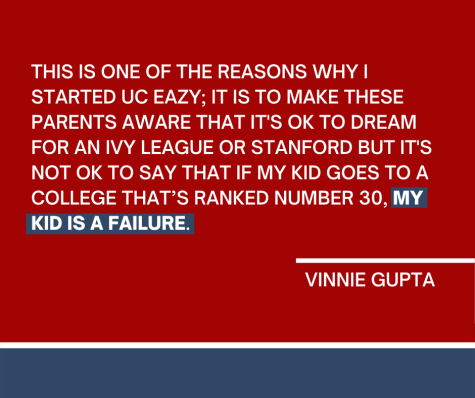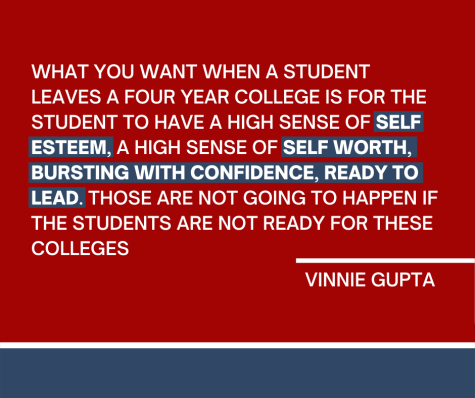Much ado about prestige
Understanding why parents place weight on the name brand of a university
Photo by MD Duran | Used with permission (Unsplash)
University prestige is a crucial selling point for many parents. Why is that the case?
April 27, 2022
When Vinnie Gupta’s daughter Vrinda was making her college list before she started applying to schools in 2008, he was not aware that there were 3,000 universities that offered four year undergrad programs. Nor was he aware that of those 3,000 programs, there were at least 200 to 300 colleges that might be a good fit for his daughter or offered the type and quality of education that she was seeking. He had never been through the process of undergraduate admission in the United States, but he was sure that he at least knew more than his daughter, and with the wisdom and experience that accompanies age, he set out to help her with her college list. One word was enough to summarize the list that ensued: prestige.
“When we prepared the college list for my older one who graduated from Monta Vista in 2009, our initial list of 10 colleges — which I led because I was the dad — included [all] eight Ivy League’s,” Gupta said. “Because it’s like, ‘I as the parent went to top colleges back in India, [so] I’ve earned the right for my kids [to] forever go to top colleges in the U.S. despite not knowing what they are.’ That was the mindset and I think some of that was a function of a chip on my shoulders.”
Gupta explains that his mindset about prestige when his daughter was applying to college is one that is common among MVHS parents, and a unique product of the immigration culture specific to the Bay Area. A large majority of parents in this area came to the U.S. only because they were successful enough in their countries of origin to actually qualify for programs that would bring them here. This, paired with a lack of knowledge about the college admission process, creates a pressure cooker of expectations and aspirations for their children, Gupta explains.

Sophomore Shravan Suresh sees this combination of high expectations and a lack of knowledge manifest in his own parents’ — both of whom are also Indian immigrants — perceptions of prestige. The name brand of a university is extremely important to his parents, Suresh explains, because of the stereotypes that are associated with various schools and the types of opportunities available to people who graduate from highly ranked schools.
“My parents barely know anything about the education system in America since it’s completely different [from] India,” Suresh said. “They have friends and a lot of connections in America and they just talk with them [to] see what their best options are for their child right now, and they follow that.”
The desire to bridge immigrant parents’ knowledge gap about college overall is what motivated Gupta to co-found UC Eazy, a virtual academy that specializes in guiding students whose families were educated outside of the U.S. through the college admission process. One of Gupta’s main missions through UC Eazy is changing parent perspectives on prestige. As an immigrant whose children have already gone through the college admission process, Gupta finds that he is uniquely situated to empathize with the stress and views of immigrant parents.
“These parents bring a very different mindset,” Gupta said. “It’s like, ‘Hey, we were awesome [in our country of origin] and hence our kids need to be awesome.’ There’s a sense of entitlement around that. I’m not beating on anyone — this was my journey. This is one of the reasons why I started UC Eazy; it is to make these parents aware that it’s OK to dream for an Ivy League or Stanford but it’s not OK to say that if my kid goes to a college that’s ranked number 30, my kid is a failure.”
Along with a lack of education — or perhaps as a product of it — Gupta believes that another reason many parents in the MVHS community deeply value the prestige of a college is because they believe that attending a highly ranked university is a one-way ticket to success. Senior Jana Woo explains that her parents, who are third-generation immigrants, value prestige in part because they ascribe to the belief that the education at those schools is of a better quality and that more opportunities were afforded to people who graduated from these schools.
“They want me to have a happy, fulfilling and successful life in the future, just because they had to work extremely hard to be where they are,” Woo said. “They want me to be at an easier stepping ground to reach a more successful place, and that’s why prestige is important to [my parents].”

Gupta believes the desire for their children to be more successful than they are is something that is “wired into the DNA of human parents” and the belief that attendance at a prestigious university is a guarantee of this is exactly why so many parents emphasize it so much. For immigrant parents specifically, Gupta explains this is a product of experiences that those parents have had in their countries of origin. In countries like India or China, there are only a handful of truly reputable universities, and testing into those schools is “an order of magnitude” more competitive than even the most selective schools in the U.S. In the U.S., the universities with the 20 lowest acceptance rates range from 3% to 11%. The average acceptance rate for all of the Indian Institute of Technology campuses, largely regarded to be the most prestigious university in India, is 0.59%, with the lowest acceptance rate being 0.25%. Gupta explains that as a result of these miniscule rates, acceptance into one of these universities was indeed a guarantee that professionally, those students would be set for life. Otherwise it was very likely that those students would struggle in finding a job.
Woo explains that she only began shedding notions of prestige after the college application process. As a computer science major, she realized that regardless of where she attended college, there would be programs that would support her education and where she could be successful. For her parents, this realization came more recently as college decisions have been released through February and March.
“When the decisions really started coming out, I was like, ‘it’s OK if I don’t go to the best school ever,’” Woo said. “Waiting for those decisions, I was super anxious and I was talking to my parents and their views on prestige shifted as well because they saw how anxious I was and how much stress it was putting on our entire family. So they’re like, ‘Actually it’s fine. You’ll be successful anywhere — you have the work ethic for Monta Vista.’ But even with that, there’s definitely an underlying tone that prestige is important.”
Gupta explains that his mindset about prestige also began shifting after going through the college application process with his children, but his change was really cemented after dropping his children off at school. He recalls the helplessness that he and his wife —FUHSD STEM lead and former AP Chemistry teacher Kavita Gupta, who is also an immigrant — felt after they said goodbye to their daughter at university. Neither parent had any idea what the undergraduate experience in the U.S. was like — they had no idea how to help their daughter navigate the potential conflicts, relationships and challenges that she’d be facing in college.
He stresses a specific statistic when thinking about college, which is that 30% of students who are the first in their families to attend four year college programs in the U.S. enter an “unhealthy emotional state.” Access to alcohol and drugs compounded with a tremendous amount of independence and a new environment often causes students to struggle. In order to avoid this, Gupta stresses the importance of considering much more than prestige when applying for college, and focusing on more than academic skills throughout adolescence.
“What I remember from my own kids that journey when they were in college was them calling me on non academic things where they just needed a hug,” Gupta said. “And I wish I could give it to them on a phone. So where am I going with this? Getting into prestigious colleges? Yes, it is desirable, but you should also choose a college where you would go and thrive. You should belong. I constantly caution students and their parents — even if you could buy your way through to Stanford, if the students are not ready, don’t bother. What you want when a student leaves a four year college is for the student to have a high sense of self esteem, a high sense of self worth, bursting with confidence, ready to lead. Those are not going to happen if the students are not ready for these colleges.”

The final reason that Gupta believes that immigrant parents specifically laud prestige is the experience of being an immigrant itself. From the moment he arrived in this country, Gupta explains that to a degree, he felt like a second class citizen. His appearance, his accent and the cultural gaps between the life he lived in India and the one in America all made him feel as though he constantly had to work extra hard in order to catch up with the world around him — an experience that he believes is ubiquitous among many immigrants.
After his son got accepted into the University of Chicago, Gupta vividly recalls visiting the university and seeing Paul Giamatti, an Academy Award-nominated actor known for his roles in “Saving Private Ryan’” and “Cinderella Man,” at a local cafe. In that moment, after years of feeling like a second class citizen, Gupta suddenly felt as though his child had “made [him] completely mainstream and leveled [his] status as an immigrant parent to a Hollywood B-Lister.” To Gupta, this experience touches on the core of why prestige matters to immigrant parents, a reason that they are not always willing to reconcile with.
“A lot of kids would say at Monta Vista that, ‘Oh, my parents are putting so much pressure,’” Gupta said. “I think we need to look at them and see that from the day they came into the U.S., it’s always like, ‘We need to try harder because we need to prove ourselves’ and suddenly, your child gets [accepted into a prestigious school]. Now you can say, ‘I’m not a second class citizen anymore, because I can now look at somebody from Hollywood or a CEO making $300 million a year and I am exactly at par with you because my kid reduced that gap.’”
Though the result of misconceptions and a lack of knowledge about the college application process can result in a lot of pressure on students — pressure which both Suresh and Woo have dealt with — Gupta emphasizes that parents are not ill-meaning, and that they simply want to help their children follow the past that most guarantees their children’s success. At UC Eazy, he has devoted a lot of time to showing parents that the mindset that they developed through attending school in a different country does not necessarily apply here.
“We want to educate these parents to focus on things like self esteem, development of the student, make them feel good about themselves so that they make the right choices,” Gupta said. “They become leaders. They take control of their own life. If you do that, these kids will not only get into good colleges, they will also have an accelerated career path. But the first thing that they need to do is to think beyond the Ivy Leagues.”

















